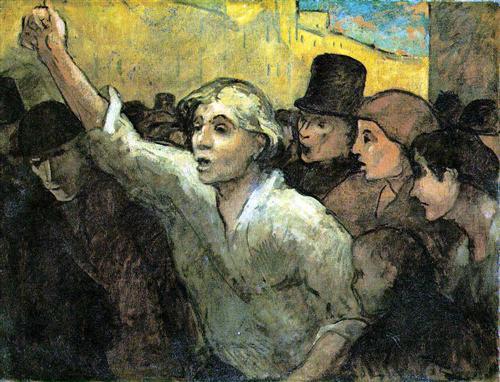
The “Critical Historical Sociology Blog: History, Theory and Sociology in an Age of Crisis” is the official blog of the American Sociological Association’s Section on Comparative and Historical Sociology.
-
Barrington Moore in Delhi? The Political Economy of the Indian Farmers’ Protest
Michael Levien From the summer of 2020 to the fall of 2021, farmers in North India staged one of the largest agrarian protests in the country’s history. The direct impulse for these protests was three farm laws introduced by President Narendra Modi’s Bharatiya Janata Party (BJP) government which proposed to further liberalize Indian agriculture by…
-
The End of an Era?: The Colombian Elections in Retrospect and Prospect
Laura Acosta and Nicolás Torres-Echeverry Colombia is an “orangutan in cutaway,” a stable democracy in perpetual violence, a paradox, many say (Bushnell 1993; Gutiérrez 2014). It is a country that has had one of the oldest electoral democracies in the world and yet it is marked by cycles of violence that reproduce one another. In…
-
Comparative Historical Sociology, the Denial of Race, and the Naming of Prizes: A Critique of Skocpol’s Theory of Revolutions
Featured image: Christopher Columbus statue outside the Minnesota State Capitol, toppled by American Indian Movement members on 10 June 2020. Photo: Tony Webster. The American Sociological Association’s (ASA) Comparative Historical Sociology (CHS) section has weathered the George Floyd uprising like most other ASA sections: little has changed. Mostly, our predominantly white albeit highly cosmopolitan collective…
-
The new Studies in Historical Sociology book series: An Interview with the Editors
Simeon J. Newman (University of Michigan) Stephanie Mudge (University of California, Davis) and Anthony Chen (Northwestern University) recently assumed the editorship of Studies in Historical Sociology, a new book series by Cambridge University Press. Since this development is likely to be of broad interest to historical sociologists, I approached them for an interview. I was…
-
Fascism, Trump and the 2020 Presidential Election: Compared to What?
Mabel Berezin, Cornell University In late 2016 in response to the widespread media narrative that linked Trump to Brexit and an array of European populists, I wrote a short essay entitled, “Trump isn’t a European-style populist: That’s our problem”, in which I argued that the comparison between Trump and his supposed European counterparts was flawed. For the most…
-
Cross-national Parallels and Contrasts in Democracy’s Travails: America’s Trumpian Experience
Robert M. Fishman, Carlos III University, Madrid The near-death experience of American democracy during the Trump presidency holds extraordinary significance for all who care about the principles of equality and freedom, but also in a rather more specific way for scholars who seek to understand patterns of similarity and difference between countries in their historical…
-
White Christian Nationalism: The Deep Story Behind the Capitol Insurrection
At first glance, the protesters who gathered around the American Capitol on 6. January seemed to be a motley crew. One observer espied: “Preppy looking country club Republicans, well-dressed social conservatives, and white Evangelicals in Jesus caps…standing shoulder to shoulder with QAnon cultists, Second Amendment cosplay commandos, and doughy, hardcore white nationalists.” The symbolism on…
-
Why Trump Lost and What Democrats Need to Do to Ensure 2016 was the Fluke and Not 2020
There are two main explanations for Trump’s 2016 victory and for his voters’ enduring loyalty. One sees his support as largely racist, a reaction by white voters against having been governed by a Black man for eight years and what many of them regard as repeated insults from privileged elites. The other focuses on Obama’s…
-
Polarized Futures and the 2020 Election
Stephanie L. Mudge, UC Davis If we are willing to set aside the truly horrifying circumstances surrounding the 2020 election from beginning to end—a big ask—and focus on certain selected facts, one could dare to argue that U.S. democracy is alive and kicking. After decades of alienation and demobilization up until 2008, voter turnout as…
About the blog
As comparative-historical sociologists, we are able to approach the most contemporary topics taking into account their longer-term geneses, but we also have the theoretical and methodological tools to approach even the oldest and most remote of matters with an eye to present-day concerns. We approach even the most local issues from the standpoint of their connections to far-flung social events and processes; and we study even the most empirical topics theoretically and critically.
We are living in an era of crises in political economy, state-society relationships, geopolitics, and academia. And we need a space to discuss crucial issues surrounding capitalism, the state, authoritarianism, social unrest, imperialism, and knowledge production from historical, comparative, and critical-theoretical perspectives.
The Critical Historical Sociology Blog: History, Theory and Sociology in an Age of Crisis aims to provide such space. We aim to serve as a hub for sociologists and scholars from other disciplines to explicitly discuss substantive, practical, and theoretical issues, reflect on research concerns and controversies, and debate current and historical events and abysses. Some examples of relevant themes include, but are not limited to:
- democracy and resurgent authoritarianism,
- political economy, capitalism and crisis,
- imperialism, (post-)empire, (post-)colonialism and the colonial present,
- history of sociology, academic freedom, and the crisis of the university.
We look forward to receiving submissions from members of the Section and the broader social scientific community on an ongoing basis.
Submissions can be sent to: chsblog1@gmail.com
Editors:
Editor in Chief:
Sahan Savas Karatasli (University of North Carolina, Greensboro)
Assistant Editors in Chief:
Simeon J. Newman (University of Michigan)
Timothy Rutzou (Yale University)
Editorial Board:
Edwin Ackerman (Syracuse University)
Mathieu Desan (University of Colorado)
Zophia Edwards (Providence College)
Luis Flores (University of Michigan)
Philip Gorski (Yale University)
Michael Kennedy (Brown University)
Richard Lachmann (State University of New York, Albany)
Beverly J. Silver (Johns Hopkins University)
George Steinmetz (University of Michigan)